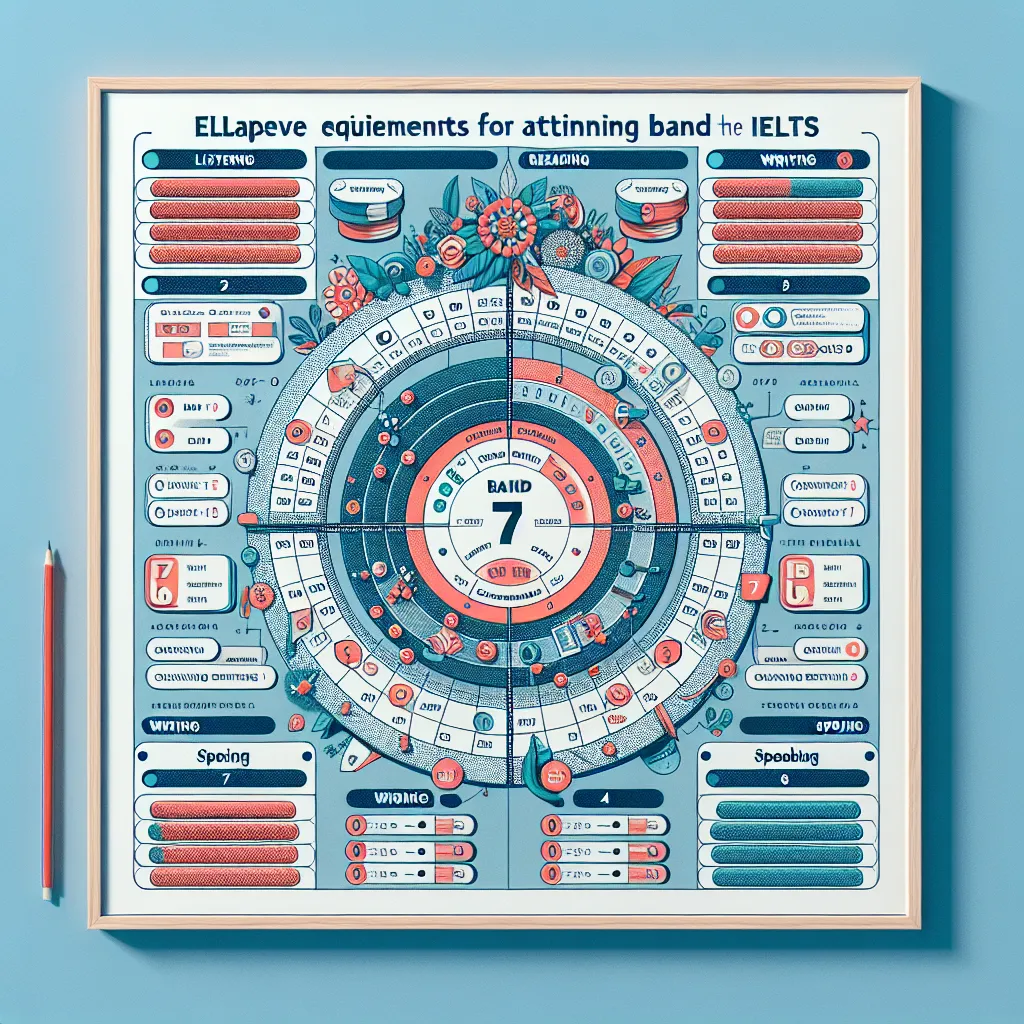Are you aiming for a Band 7 score in your IELTS exam? You’re not alone. Many test-takers set this goal as it’s often the minimum requirement for various academic and professional pursuits. Achieving a Band 7 is challenging but not impossible with the right approach and preparation. In this comprehensive guide, we’ll explore effective strategies and expert tips to help you reach that coveted Band 7 score.
Understanding the IELTS Band 7 Requirements
Before diving into strategies, it’s crucial to understand what a Band 7 represents in the IELTS scoring system. A Band 7 indicates a ‘Good User’ of English, demonstrating operational command of the language with occasional inaccuracies and misunderstandings in some situations.

Key Characteristics of a Band 7 Performance:
- Fluent and natural language use with some errors
- Wide range of vocabulary and grammar structures
- Clear organization of ideas
- Ability to handle complex language well
Strategies for Each IELTS Section
Listening
-
Familiarize yourself with accent varieties: Practice with different English accents (British, American, Australian, etc.) to improve your comprehension.
-
Improve note-taking skills: Develop a personal shorthand system to quickly jot down key information.
-
Practice active listening: Don’t just focus on individual words; try to understand the overall context and purpose of the conversation.
-
Utilize prediction techniques: Before each section, quickly scan the questions and try to predict the type of information you’ll need to listen for.
Reading
-
Enhance your skimming and scanning abilities: Practice quickly identifying main ideas and locating specific information within texts.
-
Improve your vocabulary: Focus on academic word lists and topic-specific vocabulary commonly found in IELTS texts.
-
Time management is crucial: Allocate your time wisely across all three reading passages, leaving enough time for the more challenging questions.
-
Practice with various question types: Familiarize yourself with all IELTS reading question formats to avoid surprises on test day.
Writing
-
Master essay structures: Learn and practice using appropriate structures for Task 1 and Task 2 essays.
-
Develop your ideas fully: Ensure each paragraph contains a clear main idea supported by relevant examples or explanations.
-
Use a wide range of vocabulary and grammar: Incorporate less common words and complex sentence structures, but ensure they’re used accurately.
-
Practice timed writing: Regularly write essays under test conditions to improve your speed and efficiency.
Speaking
-
Expand your range of expression: Learn idiomatic phrases and advanced vocabulary to express ideas more precisely.
-
Work on fluency: Practice speaking on various topics without long pauses or hesitations.
-
Develop your answers: Provide detailed responses with examples and explanations to showcase your language skills.
-
Improve pronunciation: Focus on stress, intonation, and individual sound production to enhance your overall clarity.
Key Tips for Overall IELTS Preparation
-
Consistent practice: Set aside regular study time and stick to a structured preparation plan.
-
Use authentic materials: Practice with official IELTS past papers and resources from reputable sources.
-
Seek feedback: Work with a tutor or join study groups to get constructive feedback on your performance.
-
Focus on your weaknesses: Identify areas where you struggle and dedicate extra time to improving them.
-
Simulate test conditions: Take full-length practice tests under timed conditions to build stamina and familiarity with the exam format.
Common Mistakes to Avoid
-
Neglecting certain skills: Don’t focus solely on your strengths; give adequate attention to all four skills.
-
Memorizing scripts: Avoid memorizing pre-written answers for the speaking test, as this can sound unnatural and rehearsed.
-
Ignoring instructions: Carefully read and follow all instructions in each section to avoid unnecessary errors.
-
Overcomplicating language: While it’s important to showcase advanced language, don’t use complex structures or vocabulary incorrectly.
-
Procrastination: Start your preparation early to allow ample time for improvement and practice.
Next Steps: Your Path to Band 7 Success
Now that you’re equipped with strategies and tips for achieving a Band 7 in IELTS, it’s time to put them into action. Here’s what you should do next:
-
Assess your current level: Take a full-length practice test to determine your starting point.
-
Create a study plan: Based on your assessment, develop a structured plan that addresses your weak areas.
-
Gather resources: Collect high-quality study materials, including official IELTS practice tests and reputable preparation books.
-
Start practicing regularly: Dedicate time each day to IELTS preparation, focusing on all four skills.
-
Track your progress: Regularly reassess your performance to monitor improvement and adjust your study plan as needed.
Remember, achieving a Band 7 in IELTS requires dedication, consistent effort, and smart preparation. By following these strategies and maintaining a positive attitude, you’ll be well on your way to reaching your IELTS goals. Good luck with your preparation, and don’t hesitate to seek additional support if you need it!